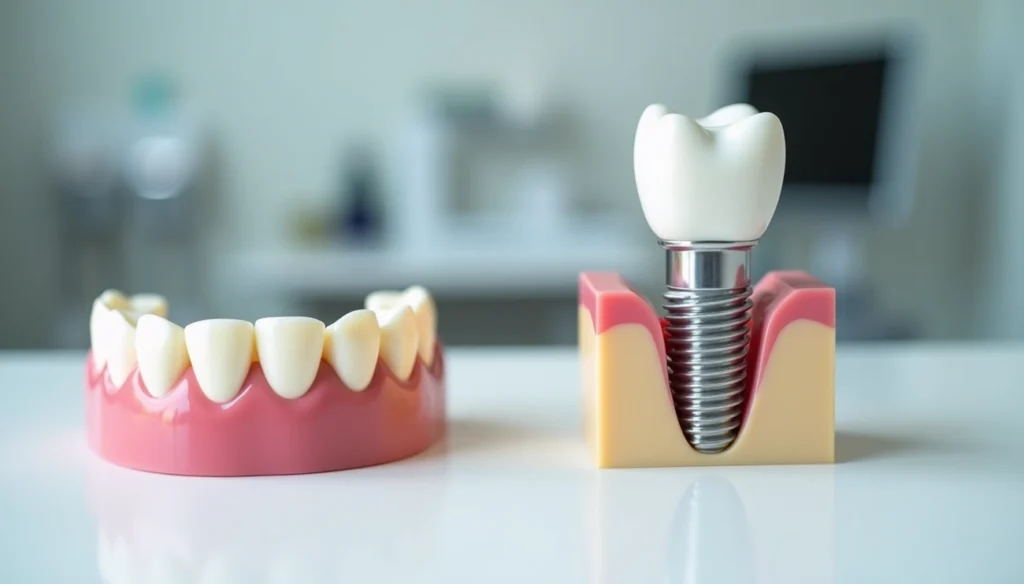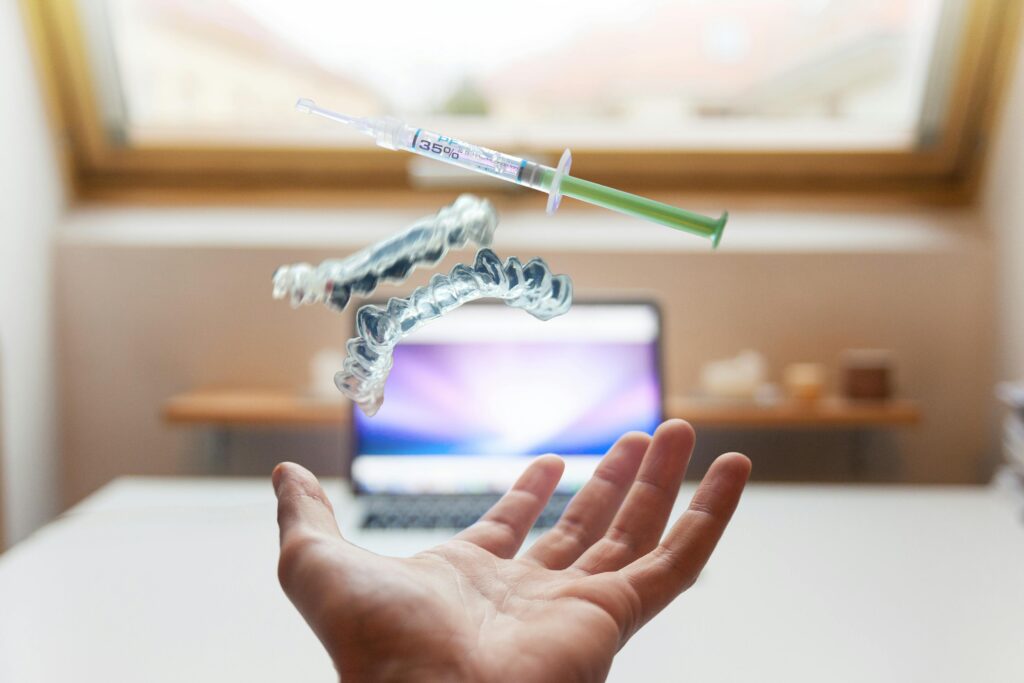The choice goes beyond just the price tag. Dentures typically need replacement every 5 to 10 years based on use and maintenance. Dental implants tell a different story – they can last forever with good care. Many patients see dental implants as a smart investment despite their higher upfront cost because they’re built to last.
This piece dives into what makes implants and dentures different. You’ll learn about their structure, advantages, drawbacks, costs, and which option might work best for you. A clear understanding of both short-term and long-term effects will help you pick the right solution that fits your dental health, daily life, and financial situation.
What are dental implants and dentures?
Tooth replacement options are more advanced now than ever before. Patients can choose from different solutions that match their needs and situation. Knowing the difference between dental implants and dentures helps people make better choices about their dental care.
How dentures work
Dentures are removable devices that replace missing teeth and surrounding tissues. They sit on the gums and stay in place through suction, adhesives, or clasps that attach to other teeth. Different types of dentures include:
- Full dentures (complete dentures): Replace all teeth in your upper or lower jaw
- Partial dentures: Fill gaps from several missing teeth and use clasps around natural teeth to stay stable
- Immediate dentures: You wear these right after tooth removal before getting permanent ones
- Implant-supported dentures: Connect to dental implants for better stability but you can still remove them
Making dentures starts with taking impressions of your mouth. A stone model comes next, followed by crafting the actual denture from materials like acrylic resin, nylon, metal, or porcelain.
How dental implants work
Dental implants replace missing tooth roots with small titanium posts that dentists surgically place in your jawbone. These implants have three main parts:
- Threaded post: A surgeon puts this into your jawbone to work like a tooth root
- Abutment: This connector screws into the implant and sticks out past your gums
- Restoration: The part you see (crown, bridge, or denture) that attaches to the abutment
Your jawbone fuses with the implant through a process called osseointegration. This healing takes three to nine months and creates a strong base for your new tooth.
Key differences in structure and placement
The biggest difference between these options comes down to permanence and stability. Dental implants become part of your jawbone and won’t move or make noise. Dentures rest on your gums and you can take them out each day.
Your bone health also changes differently with each option. Implants keep your jawbone healthy by stimulating it, which stops it from wearing away after tooth loss. Regular dentures might speed up bone loss because they put pressure on the bone underneath.
Implants work better too. They give you 90% chewing function while traditional dentures only provide 25%. This makes implants feel more like your natural teeth.
Pros and cons of dentures vs dental implants
Image Source: Dentist Beaufort SC
Making a choice between dental implants and dentures requires you to understand their strengths and limitations. Each option comes with its own set of advantages and drawbacks that could affect your decision.
Advantages of dentures
We chose dentures as a tooth replacement option because they’re affordable. These cost nowhere near as much as dental implants upfront. On top of that, dentures can match your mouth’s unique shape perfectly, which helps you stay comfortable all day.
You’ll get results fast with dentures—they’re ready to wear just weeks after your first dental visit. This quick timeline lets patients restore their smile and eat faster than with implants.
Dentures help bring back your facial appearance and confidence. They support facial muscles that might sink after losing teeth. You won’t need surgery to get them (unless you want implant-supported ones), which makes them perfect for people who can’t handle invasive procedures.
Drawbacks of dentures
Dentures come with several challenges. Many people say their dentures move around or slip out while they talk or eat. This can make them uncomfortable and cause embarrassing moments.
Taking care of dentures is another big issue. You’ll need to clean them daily with special solutions to avoid infections and bad breath. You must also take them out at night and store them correctly.
The biggest problem is that regular dentures don’t stop your jawbone from wearing away. Your body starts taking minerals from your jaw after tooth loss, which leads to bone loss over time. So you’ll need new dentures every 5-7 years as your mouth changes shape.
Benefits of dental implants
Dental implants are groundbreaking in how they work and feel natural. They let you chew about 90% as well as natural teeth, while regular dentures only give you 25%. These implants look, feel, and work just like real teeth.
Your jawbone stays healthy with implants. They stimulate the bone, unlike dentures, which helps maintain your face’s shape. This happens because implants replace the whole tooth, including the root.
You won’t worry about slipping or moving with implants—they’re fixed firmly in your jawbone. Take good care of them and they’ll last a lifetime, much longer than dentures that need replacing every 5-7 years.
Limitations of dental implants
The main drawback of dental implants is their price—you’ll pay more upfront than other options. Your insurance might not cover implant procedures, which adds to the cost.
You need enough bone density for implants to work. Long-term tooth loss or gum disease can wear down your bone, and you might need bone grafts first.
The time it takes is another challenge—you’ll need several appointments over 6-12 months. After placing the implant, you’ll wait 3-9 months for it to heal and bond with your bone before getting the final tooth.
Implant surgery carries some risks, though minor ones, like infection, nerve damage, and bleeding. These issues show up in about 5-10% of cases.
Cost comparison and long-term value
Image Source: Bookimed
Money plays a big role when patients think over tooth replacement options. The original price difference between these options can seem huge at first.
Upfront costs of dentures and implants
Dentures come with a lower original cost, with complete dentures averaging $1,000-$1,500 per arch. A single dental implant costs between $3,000-$6,000, and the national average sits around $2,143. This price gap looks substantial, especially when you have multiple teeth that need replacement.
Replacement and maintenance costs
Dentures might cost less upfront but they need replacement every 5-10 years. They also need relining every 3-5 years, which costs $200-$500 per adjustment. Dental implants have different maintenance needs—yearly costs average about 9% of the original treatment cost over a 10-year period. Technical problems like abutment fracture might cost up to 27% of original costs, while biological issues such as peri-implantitis add about 19%.
Insurance coverage and financing options
Insurance plans vary a lot, and most cover dentures more easily than implants. All the same, many providers offer budget-friendly options through partners like CareCredit or ONEderful Finance. HSA or FSA funds can help reduce out-of-pocket costs.
Which is more cost-effective over time?
Implants might cost more upfront but they save money long-term. A 30-year cost analysis shows implants’ total expenses ($12,500-$21,000) can be cheaper than bridges ($16,000-$24,000) or partial dentures ($13,000-$21,000). Cost-effectiveness studies show that implant treatment often results in overall savings.
Who should choose which?
Image Source: Dr. Paul’s Dental Clinic
The choice between dental implants and dentures ended up depending on your personal situation. You need to evaluate several personal factors to find the right fit.
Ideal candidates for dentures
Dentures work best if you’re missing multiple teeth and want a non-invasive, quicker solution. People with much bone loss or gum problems that make implants difficult might find dentures more suitable. On top of that, patients looking for a budget-friendly option might prefer dentures since they need less original financial commitment.
Ideal candidates for implants
Dental implants suit patients who have enough jawbone density and healthy gums. Good overall health will give a better chance of proper healing after surgery. Non-smokers or those ready to quit show better success rates with implants because smoking can slow down healing. Active people tend to choose implants for their better stability.
Health and lifestyle considerations
Implants give you more freedom to enjoy different foods thanks to their stability. Dentures need regular cleaning to avoid infections and bad breath. Some health conditions might rule out surgery, which makes dentures the better choice in certain cases.
Age and bone density factors
Bone density reaches its peak around age 30 and then starts declining. Women between 50-60 years show higher bone loss rates, which might link to menopause. Your age alone doesn’t rule out implants, but you need adequate bone support.
Surgical risks and recovery time
Implant surgery carries risks like infection and nerve damage. Recovery needs time – bone integration usually takes 3-6 months. Dentures offer a faster way to restore your smile.
Conclusion
Your choice between dental implants and dentures depends on your situation, priorities, and budget. Dentures give you a cheaper upfront option with faster results. Dental implants, however, last longer and work better while preserving your bone health over time.
You should weigh both short-term and long-term factors before making your decision. Without doubt, dentures might work better if you want a non-surgical option with lower original costs. This is especially true if you don’t have enough bone density or have health restrictions. On the flip side, dental implants could be your best bet if you want a permanent solution that feels like natural teeth, even though they cost more upfront.
Money plays a big role in this choice. All the same, you need to look at the long-term value too. Dental implants can last decades or even a lifetime with good care. Dentures need replacement every 5-10 years, which means implants might save you money in the long run.
Your quality of life matters just as much as costs. Implants let you eat, speak, and smile without worry about slipping or taking them out to clean. On top of that, they keep your jawbone healthy and prevent that sunken look that often comes with wearing dentures long-term.
Both options have improved substantially over the last several years, looking and working better than ever. A chat with your dentist can help you get customized advice based on your oral health, medical history, and lifestyle. The best tooth replacement option matches your current needs with long-term oral health goals, so you can keep smiling confidently for years to come.
FAQs
Q1. What are the main differences between dental implants and dentures? Dental implants are surgically embedded in the jawbone, providing a permanent solution that won’t slip or make noise. Dentures, on the other hand, rest on the gums and can be removed daily. Implants stimulate and preserve jawbone health, while traditional dentures may accelerate bone loss.
Q2. How do the costs of dental implants and dentures compare? Initially, dentures are less expensive, with complete dentures averaging $1,000-$1,500 per arch. A single dental implant can cost between $3,000-$6,000. However, dentures need replacement every 5-10 years, while implants can last a lifetime with proper care, potentially making them more cost-effective in the long run.
Q3. Who are ideal candidates for dental implants? Ideal candidates for dental implants are individuals with sufficient jawbone density, healthy gums, and good overall health. Non-smokers or those willing to quit smoking have better success rates with implants. People leading active lifestyles often prefer implants for their superior stability and functionality.
Q4. What are the advantages of choosing dentures? Dentures are more affordable upfront, can be customized for comfort, and offer quicker results – they can be made and worn within weeks. They’re suitable for those seeking a non-invasive solution, especially if they have significant bone loss or gum issues that make implants challenging.
Q5. How long does the process take for dental implants versus dentures? The denture process is relatively quick, with patients able to wear them within weeks of their first dental visit. Dental implants, however, require a longer timeline. The entire implantation process typically takes multiple appointments over 6-12 months, including a 3-9 month healing and osseointegration period before the final restoration can be attached.



